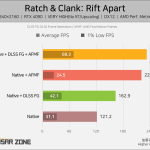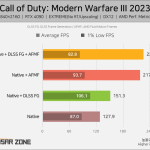Imagine you could stack Nvidia and AMD Frame Generation technologies to bump up the FPS. Although it seems unlikely, it's possible to do it in some games, namely Cyberpunk 2077, Modern Warfare 3, and Ratchet & Clank: Rift Apart. However, depending on the game, the results vary greatly, so this is more of an interesting experiment, rather than a truly practical use case.
It has been shown by QuasarZone that Frame Generation technologies from two different businesses may be used together, but increased performance does not necessarily equate to smoother gaming. Additionally, this method requires specific graphics settings and two graphics cards.
Image credit: QuasarZone
Nvidia's DLSS 3 includes Frame Generation, which is only supported by RTX 40 graphics cards. On the other hand, AMD's Fluid Motion Frames technology is part of the FSR 3 stack and needs an AMD GPU and the respective driver. Both technologies only work in specific games, so first, the media outlet had to pick games that fulfil this requirement.
To make both technologies work together, you'll also need two GPUs. In this case, an RTX 4090 (rendering GPU) and an RX 6600 were used, with the latter being connected to the main display. This way, the Nvidia GPU renders the games using DLSS 3 FG technology, but the output image is then interpolated using AFMF, resulting in an average framerate increase of up to 290% above native resolution. In comparison, with DLSS 3 alone, games would increase by up to 50% in the average framerate. With AFMF only, games would see an increase of up to 200%.
As previously mentioned, this setup is not without tradeoffs and may not always provide the best results. While the average framerate will increase, so will the 1% lows, creating a situation where the frame rate doesn't feel as fluid as it should. Power consumption is also higher and while the RTX 4090 was set up to handle game rendering, GPU usage for the RX 6600 still jumped up to 90% using AFMF.
Discuss on our Facebook page, HERE.
KitGuru says: Although promising, it is improbable that AMD and Nvidia will ever officially or unofficially collaborate to merge their technologies. Additionally, artificially doubling previously interpolated frames should produce even more visual defects than using a single technology.
 KitGuru KitGuru.net – Tech News | Hardware News | Hardware Reviews | IOS | Mobile | Gaming | Graphics Cards
KitGuru KitGuru.net – Tech News | Hardware News | Hardware Reviews | IOS | Mobile | Gaming | Graphics Cards





